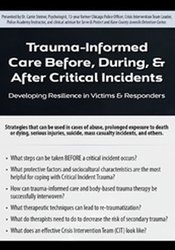

Critical Incident Trauma: How to Prepare for It, Cope with It, and Survive after It
Many current offerings on critical incident trauma fall short by dealing almost exclusively with the aftermath of the event, the symptoms of trauma exposure, and basic treatment options. Successful coping also requires prevention and intervention, as well as an understanding of pre-event, event, and post-event factors that impact trauma and a negative or resilient response to it.
In this recording, Dr. Carrie Steiner, a Police Psychologist and former Chicago police officer, shows you an engaging exploration of how to positively impact the lives of victims, responders, and law enforcement agencies before, during, and after critical incidents. Dr. Steiner’s professional experience is invaluable as she shares first-hand knowledge of the successes that accompany the use of Crisis Intervention Team (CIT) programs, as well as clinical strategies such as EMDR, Prolonged Exposure, Yoga, and somatic experiencing. Her presentation is practical and realistic, with honest dialogue about how to handle both the factors that we can control in a traumatic event, and those we cannot.
| File type | File name | Number of pages | |
|---|---|---|---|
| Manual - Trauma-Informed Care Before, During, & After Critical Incidents (0.99 MB) | 58 Pages | Available after Purchase | |
| Manual - Trauma-Informed Care Before, During, & After Critical Incidents - French (0.99 MB) | 58 Pages | Available after Purchase | |
| Manual - Trauma-Informed Care Before, During, & After Critical Incidents - Italian (0.99 MB) | 58 Pages | Available after Purchase |
Carrie Steiner, PsyD, is a licensed clinical psychologist and founder of the First Responders Wellness Center, a private practice agency meeting the needs of first responders and their family members for trauma therapy and emotional wellness. As a psychologist, she specializes in trauma therapy utilizing EMDR, prolonged exposure therapy, and cognitive behavioral therapy as well as conducts police and public safety psychological evaluations and fitness for duty evaluations.
Dr. Steiner is also the clinical advisor and board member for Serve & Protect, a nonprofit organization that facilitates trauma services and a 24-hour crisis line for public safety professionals and their families. Dr. Steiner is a member of the International Chiefs of Police, Illinois Chiefs of Police, Illinois Psychological Association, and member of Division 18 of the American Psychological Association.
Dr. Steiner is a 13 year former Chicago Police Officer, Crisis Intervention Team Leader, peer support member, and Chicago Police Academy instructor. While working for the Chicago Police Department, she spearheaded their veteran CIT training and autism spectrum training for law enforcement. She also has FBI hostage negotiation training, has worked as a psychologist for Cook County and Kane County Jails as well as collaborated with federal government agencies on high risk cases involving the mentally ill. She speaks nationally on mental illness, DSM-5® and ICD-10, de-escalation techniques and police response, trauma and PTSD, officer wellness, CIT, peer support, and has several national and local awards.
Speaker Disclosures:
Financial: Carrie Steiner is the founder of First Responders Wellness Center. She receives a speaking honorarium from PESI, Inc.
Non-financial: Carrie Steiner is a member of the American Psychological Association; and the International Association of Trauma Professionals.
TRAUMA INFORMED CARE: TRAUMA AWARENESS AND BRAIN RESPONSE
PRE-EVENT FACTORS THAT SHAPE TRAUMA COPING ABILITIES
EVENT FACTORS THAT SHAPE TRAUMA RESPONSE
POST-EVENT FACTORS THAT SHAPE TRAUMA HEALING
Please wait ...